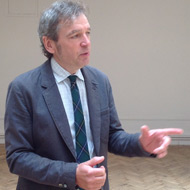New veterinary nurses inspired at CQ Graduation Ceremony

Mark emphasised the need for veterinary nurses to retain a flexibility of mind as their careers progressed.
In a powerful presentation, TV vet and animal welfare advocate, Mark Evans, has just inspired almost 40 veterinary nurses at the Central Qualifications Graduation Ceremony in London.
"You are here today because you are realising a dream and entering the veterinary nursing profession as a career," he said. "Whenever an opportunity presents itself, grab it." He illustrated this point by revisiting a photograph of his year at the Royal Veterinary College on its graduation day and pointing out the diversity of jobs that his contemporaries are now involved in.
Using a series of entertaining anecdotes about his professional career, Mark emphasised the need for veterinary nurses to retain a flexibility of mind as their careers progressed. They should not undervalue their skills and their ability to make a difference – not only to individual animals, but also to global climate and welfare issues.
He also praised veterinary nurses for their ability to work in teams and encouraged them to use this on a daily basis; and he stressed the importance of recognising the "fantastic, incredible biology" of the animals that we deal with every day. "Extraordinary biology to be nurtured."
"This is your time to fly," said Mark. "What a great time to be taking off!" He said that although specialisation is gathering pace in the veterinary profession at the moment – and that the media heroes appear to attract the limelight – just as heroic are the vets and veterinary nurses working at the coal face of veterinary practice day in day out to promote the very best in animal welfare. The really important areas are those that are preventable – obesity, physical abnormalities, trafficking
"I want to see vet nurses doing more to stand up for the welfare of animals, not only in practice but at global and government levels. Please don't just bury your heads in the everyday workload. Stand up, stand back and speak out. It is time for you to be heard, challenge tradition and dare to do things differently...
"But most importantly, whenever you have the chance to speak for animals, make sure you shout out on their behalf."



 The veterinary mental health charity Vetlife is inviting the veterinary community to join it for a sponsored cold-water dip.
The veterinary mental health charity Vetlife is inviting the veterinary community to join it for a sponsored cold-water dip.